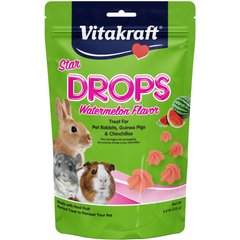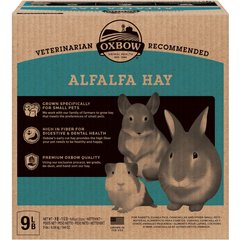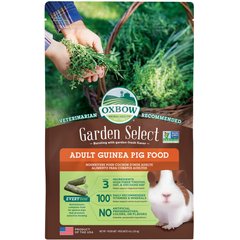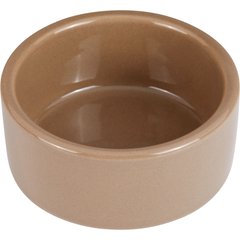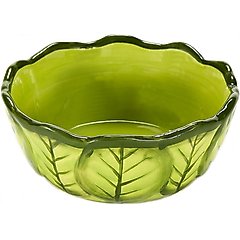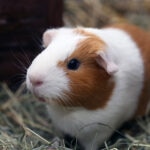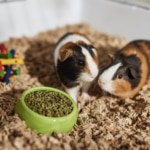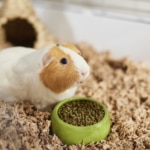Can Guinea Pigs Eat Watermelon?
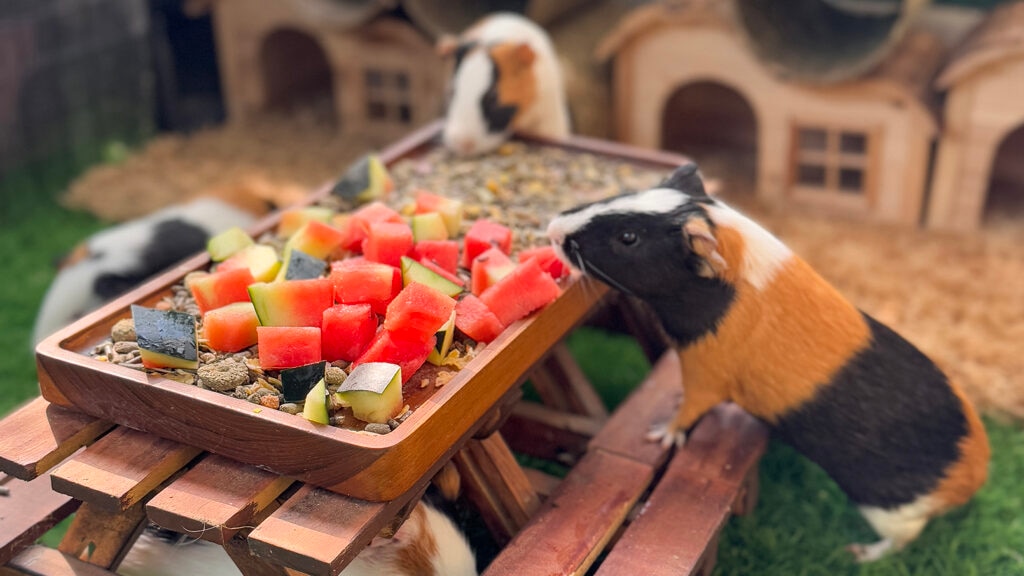
Photo by mtreasure/iStock/Getty Images Plus
If you’re enjoying a juicy slice of watermelon and wondering, “Can guinea pigs eat watermelon?” the answer is yes! However, like any treat, it’s essential to offer it in moderation.
Guinea pigs have delicate digestive systems, so when introducing new foods—especially sugary fruits like watermelon—you should do so gradually and keep an eye on how they respond.
With the right balance, fruit can be a refreshing snack, but guinea pigs and watermelon aren’t always the perfect match. Here’s everything you need to know about the benefits and potential risks before sharing this sweet treat with your guinea pig.
Before introducing any new food into your guinea pig’s diet, always check with your veterinarian.
Can Guinea Pigs Have Watermelon?
Yes! Guinea pigs can eat watermelon, as long as it’s served in small amounts and in moderation. (More about serving sizes below.)
The best watermelon to feed guinea pigs is fresh, ripe watermelon. Pick a seedless variety, if possible, to avoid choking hazards. And avoid overripe or fermented pieces, as they can cause digestive upset.
Recommended Product
Is Watermelon Good for Guinea Pigs?
While watermelon should never be a staple in a guinea pig’s diet, it does offer some key nutrients. Here’s a quick look at some of the benefits, according to Katrina Bocchine, DVM, veterinarian at Avian & Exotic Philly Vet Medical Surgical Clinic in Philadelphia, Pennsylvania:
- It provides hydration. Watermelon is about 90% water, so it can help keep guinea pigs hydrated, especially in hot weather.
- It’s a source of vitamin C. Guinea pigs can’t produce their own vitamin C, so they need it from their diet. Watermelon contains small amounts, which can support their immune system and prevent scurvy.
- It’s low in calories. Compared to some other fruits, watermelon is relatively low in calories, making it a light treat.
- It’s rich in antioxidants. Watermelon has antioxidants—most notably lycopene and beta-carotene—that fight cell damage and support overall health.
- It contains fiber. Though not as fiber-rich as hay or leafy greens, watermelon has some fiber that can aid digestion and support gut health.
Is Watermelon Bad for Guinea Pigs?
Can guinea pigs have watermelon without risks? The answer depends on how much and how often you offer it.
While watermelon can be a tasty treat, overfeeding it can lead to digestive issues or other health concerns.
Here are the potential risks of giving watermelon to guinea pigs:
- Gastrointestinal dysbiosis: Because watermelon has a higher sugar content than a guinea pig’s normal diet, it can disrupt the normal gut flora. This can lead to serious, if not fatal, illness, according to Cathy Johnson-Delaney, DVM, board of directors chair at the Association of Exotic Mammal Veterinarians. It can also cause uncomfortable gas.
- High sugar content: The sugar in watermelon can also contribute to obesity or diabetes, if given in excess.
- Too much water: Guinea pigs have sensitive digestive systems, so sudden dietary changes or too much watery fruit, like watermelon, can cause diarrhea or bloating.
- Choking hazard: Black seeds can be a choking hazard or cause digestive blockages. The thick, dark green outer rind is also tough, and harder for guinea pigs to chew and digest.
- Nutritional imbalance: Watermelon lacks essential nutrients guinea pigs need for a balanced diet. Too much may make them eat less hay, which is crucial for their digestive and dental health.
- No teeth wear: A guinea pig’s teeth grow constantly, so they need to constantly wear them down by chewing tough, fibrous foods, like hay. Watermelon does nothing for this near-constant teeth wearing that guinea pigs need, says Dr. Johnson-Delaney.
How Much Watermelon Can I Give My Guinea Pig?
Fruits are not part of a guinea pig’s natural diet, so they should be considered very occasional treats, says Dr. Johnson-Delaney. That means feeding them only in moderation.
Treats should make up no more than 5% of your cavy’s daily diet. The rest should come from a well-balanced diet of high-quality grass hay, fresh veggies, and pellets.
So, how much watermelon can you give your guinea pig? Dr. Bocchine recommends a small piece—1 teaspoon-size cube—once or twice a week as an occasional treat.
Recommended Products
How To Safely Feed Watermelon to Guinea Pigs
- Wash the outer rind. Even though you won’t be feeding the hard rind, wash the melon to remove dirt or pesticides.
- Remove seeds. If the watermelon has seeds, carefully remove them as they can be a choking hazard.
- Cut into bite-size pieces. Slice the watermelon into small cubes or thin strips that are easy for your guinea pig to nibble on. Remove the rind, only leaving the fresh fruit behind.
- Serve fresh. Add fresh watermelon to their food dish, or give it to them as a treat by hand. If your guinea pig doesn’t eat the watermelon within the hour, remove any leftovers to prevent spoilage.
Recommended Products
My Guinea Pig Ate Too Much Watermelon—What Do I Do?
If your guinea pig accidentally eats too much watermelon, don’t panic. Watch for potential side effects of overconsumption.
Guinea pigs have sensitive digestive systems, and watermelon is high in water content, which can cause gastrointestinal distress if consumed in excess. Signs may include:
- Diarrhea
- Bloating
- Upset stomach
If you notice any of these signs, remove the watermelon and monitor your guinea pig’s behavior closely. Contact your vet for advice if symptoms persist or worsen.
What Other Fruits Can Guinea Pigs Eat?
What fruit can guinea pigs eat besides watermelon? There are several others that are safe for guinea pigs to enjoy in moderation, including:
- Apples (without seeds)
- Bananas
- Blueberries
- Cantaloupe
- Grapes
- Pears (without seeds)
- Peaches
- Strawberries
FAQs About Watermelon and Guinea Pigs
Q: Can baby guinea pigs eat watermelon?
A: Baby guinea pigs shouldn’t have watermelon until they’re at least 3 weeks old. Even then, Dr. Bocchine says, they should only have a tiny amount—about the size of a small fingernail.
Q: Can guinea pigs eat watermelon rind?
A: No, guinea pigs shouldn’t eat the watermelon rind. It’s tough and difficult to digest. Plus, the rind has more concentrated amounts of agricultural chemicals and bacteria, says Dr. Johnson-Delaney.
Q: What fruit is toxic to guinea pigs?
A: Because fruit isn’t a natural part of a guinea pig’s diet, there are several that can be harmful, including:
- Avocado
- Bananas (unripe)
- Coconut
- Dried fruits
- Grapefruit
- Lemon
- Lime
- Rhubarb
Oranges, pineapples, and grapes should be given with caution, says Dr. Bocchine.
Attributions
This content was medically reviewed by Teresa Manucy, DVM, Chewy veterinarian.
